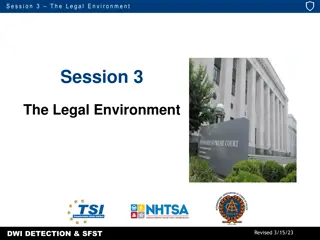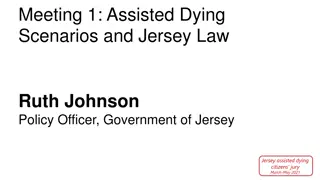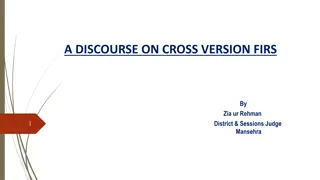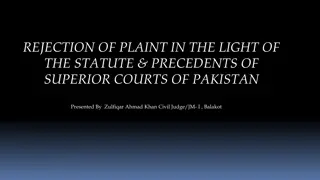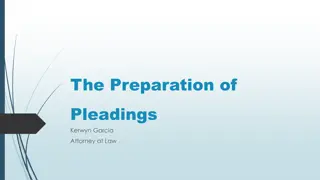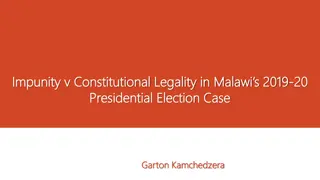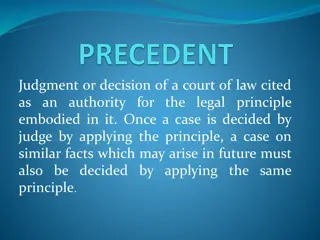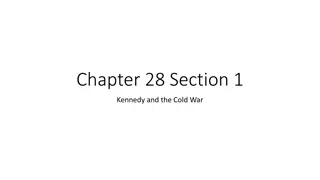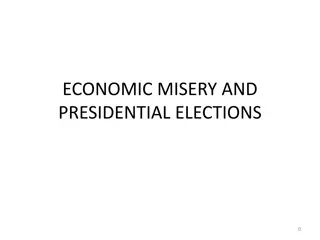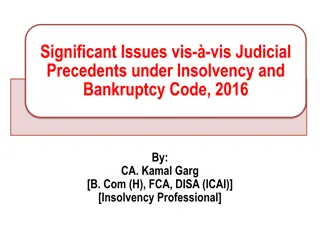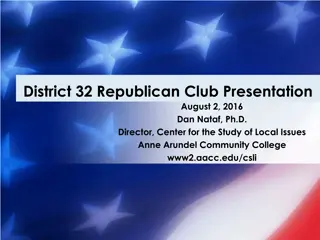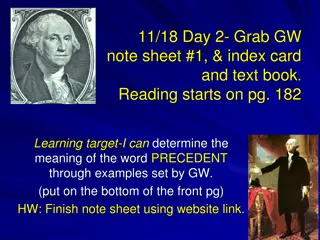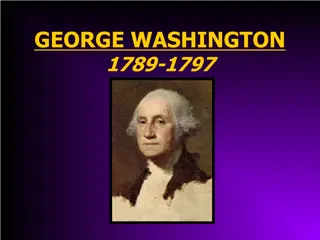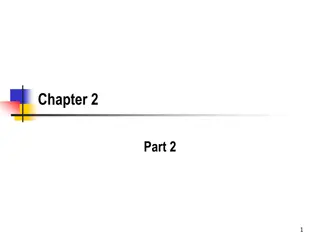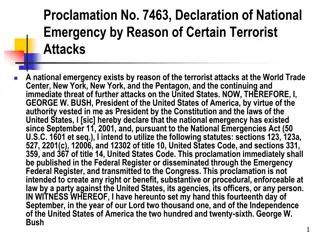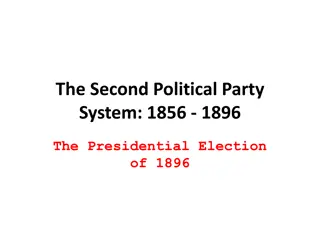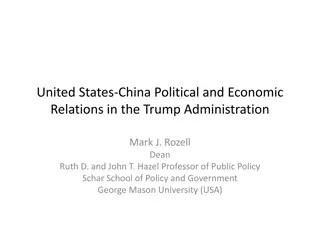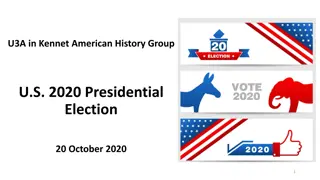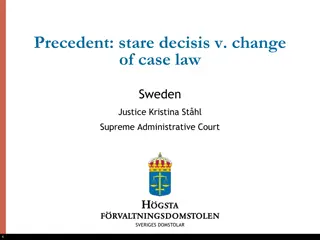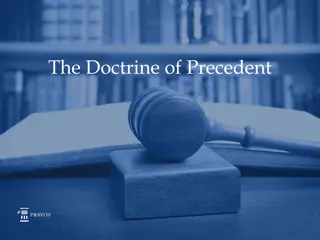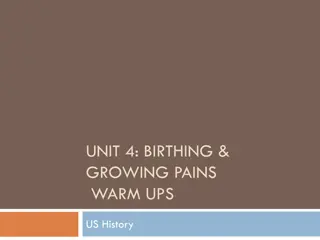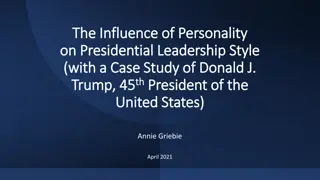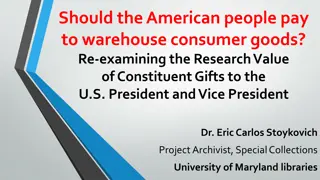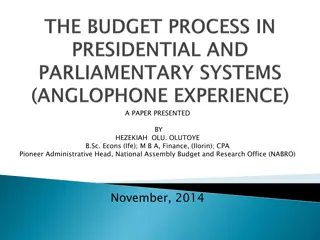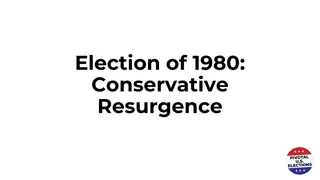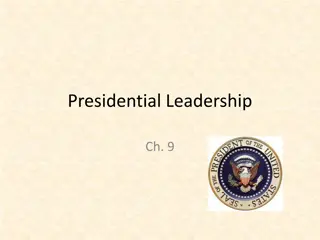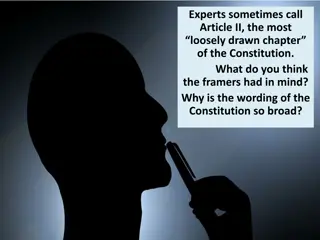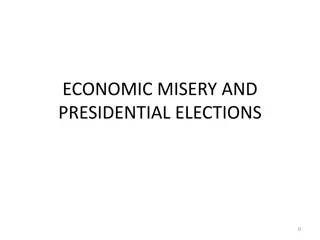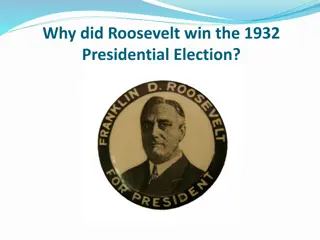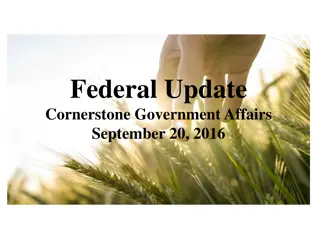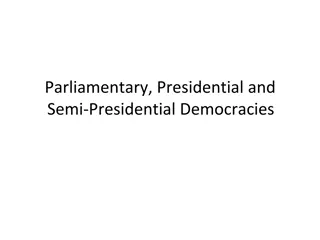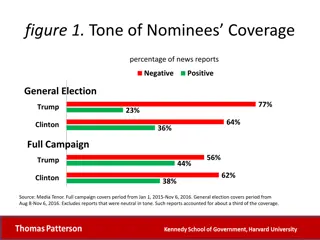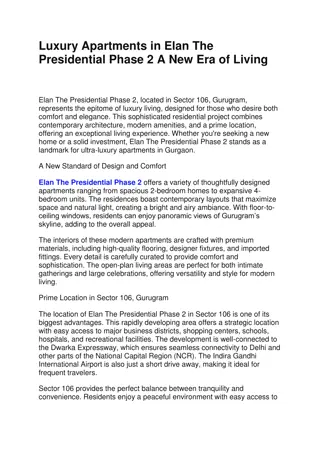Recent Judicial Decisions Impacting Uganda's Banking Sector
The judicial decisions regarding Uganda's banking sector, including issues like cryptocurrencies, digital fraud, bank valuers' liability, and property disputes, highlight crucial legal precedents and implications for both banks and customers. These rulings provide insights into the evolving landscap
0 views • 20 slides
Understanding DWI Detection & SFST in the Legal Environment
Explore the legal aspects of DWI detection and Standardized Field Sobriety Testing (SFST) including DUI offenses, implied consent provisions, chemical test evidence, and case law precedents. Delve into the specifics of Tennessee's DUI statute T.C.A. 55-10-401 related to driving under the influence o
0 views • 76 slides
Legal Positions on Assisted Dying in Jersey: Scenarios and Analysis
Explore the legal positions on euthanasia, physician-assisted suicide, assisted suicide, and treatment withdrawal in Jersey through four scenarios discussed by Suzanne and Alex. Understand the similarities and differences in the legal landscape, including the handling of cases involving end-of-life
0 views • 7 slides
Understanding Cross-Version FIRs and Criminal Justice System
This discourse led by Zia ur Rehman, a District & Sessions Judge, Mansehra, sheds light on the evolution, challenges, and solutions related to multiple versions of First Information Reports (FIRs). It also addresses the effectiveness and issues in the criminal justice system in Pakistan, with a stat
1 views • 33 slides
Rejection of Plaint under the Code of Civil Procedure in Pakistan
The Code of Civil Procedure in Pakistan governs the administration of civil justice, with provisions for rejecting a plaintiff's claim under specific circumstances. Grounds for rejection include insufficiently disclosing the cause of action, improper valuation of relief, insufficient stamping on pap
0 views • 17 slides
Key Principles of Pleading in Civil Proceedings
Pleadings in civil proceedings serve the critical purpose of defining issues and providing fair notice to all parties involved. Key rules such as claimant and defendant duties, need for concise statements of facts, and importance of informing parties in advance are emphasized through legal precedent
0 views • 28 slides
Impunity vs. Constitutional Legality in Malawi's 2019 Presidential Election Case
Explore the conflict between impunity and constitutional legality in Malawi's 2019 Presidential Election case. The concept, approach, and argument related to allopoietic law implementation, interpretative inquiry, and rejection of mediocrity are discussed in detail. The battle against impunity and m
0 views • 10 slides
Understanding Judicial Precedents and Their Significance in Legal Practice
Judicial precedents are decisions of a court of law that serve as legal authorities for future cases with similar facts. They establish principles to be followed by lower courts until overruled. Examples from England and India illustrate the importance and applicability of precedents in the legal sy
0 views • 16 slides
Kennedy and the Cold War: A Presidential Election and New Strategies
Kennedy's victory over Nixon in the 1960 presidential election paved the way for new Cold War strategies. Despite differences in upbringing, Kennedy's televised debate win and swift actions during unexpected events secured his narrow victory. With a focus on enhancing the nation's armed forces, Kenn
0 views • 17 slides
Insight into Economic Misery and Presidential Elections
Exploring the relationship between economic indicators like unemployment rate, inflation rate, and real GDP, and their impact on presidential elections. Discusses the Misery Index, real GDP per capita growth rule, and effective economic rules that influence election outcomes.
5 views • 4 slides
Key Judicial Precedents on Insolvency and Bankruptcy Code, 2016
Key judicial precedents under the Insolvency and Bankruptcy Code, 2016 are discussed, including rulings on insolvency pleas, distribution of profits during Corporate Insolvency Resolution Process (CIRP), obligations of unrelated parties, the 90-day period for filing claims, and the interaction of mo
1 views • 21 slides
A Comprehensive Guide To Safety and Confidentiality With Presidential Charters
Learn about the unparalleled safety and confidentiality features of presidential charters in London. This comprehensive guide provides insights into the elite services tailored for high-profile travelers.
0 views • 1 slides
Analysis of Presidential Race Shift to New Hampshire
The Republican presidential race has moved to New Hampshire following the Iowa caucuses, with former President Trump showcasing strong momentum. Nikki Haley emerges as a prominent challenger, while DeSantis suspends his campaign. The significance of Iowa and New Hampshire in the nomination process i
0 views • 5 slides
Analysis of 2016 Presidential Election: Polling, Match-ups, and Voting Intentions
Presentation by Dr. Dan Nataf at the District 32 Republican Club focused on the 2016 Presidential Election. It covers current state of the race, polling data, hypothetical match-ups between candidates like Trump, Clinton, and Sanders, favorability ratings, voting intentions in the primaries, and gen
0 views • 36 slides
Understanding Presidential Precedents in US History
Learn about the concept of presidential precedents through the pioneering actions of George Washington as the first President of the United States in 1789. Explore how these precedents, such as the Judiciary Act of 1789 and the Unwritten Constitution, have shaped the functioning of the US government
0 views • 24 slides
George Washington's Presidency: Establishing Governmental Precedents
George Washington, as the first President of the United States, set important precedents during his two terms in office from 1789 to 1797. He established the federal court system under the Judiciary Act of 1789, appointed the first Supreme Court justices including John Jay, and formed the first Pres
0 views • 16 slides
Understanding Presidential Control and Executive Power in the United States
In this detailed content, various aspects of presidential control over agencies, the executive power vested in the President, the Appointments Clause, and the concept of the Unitary Executive in the U.S. government are explored. The text delves into how the President appoints and removes officers, t
1 views • 36 slides
Understanding National Emergency Declarations and Emergency Powers Laws
This content delves into the legal aspects of national emergency declarations, emergency powers laws, and judicial review of emergency declarations. It covers the purpose, termination, historical context, congressional oversight, and impact on presidential powers. It also explores the complexities o
0 views • 6 slides
Political Landscape and Elections in the Late 19th Century
The political scene in the late 19th century in the United States was marked by the rise of the Second Party System, leading up to the pivotal Presidential Election of 1896. The Congressional elections of the era reflected shifts in power between Democrats, Republicans, and various opposition groups
0 views • 12 slides
US-China Relations in the Trump Administration: Unilateral Presidential Actions and Congressional Dynamics
The article discusses the evolving US-China political and economic relations during the Trump administration, focusing on unilateral presidential actions, Congress's role, and the influence of the federal courts. It highlights President Trump's aggressive trade agenda, challenges to his reliance on
0 views • 24 slides
Insights into the 2020 US Presidential Election and American Political Landscape
Delve into the 2020 US Presidential Election through the lens of the U3A in Kennet American History Group. Explore key factors influencing elections, the role of political parties, and the challenges faced by the nation. Discover the dynamics of electoral votes, county results, and candidate strateg
0 views • 22 slides
Understanding Precedents in the Swedish Court System
The Swedish court system comprises general courts for criminal and private law, and administrative courts for tax and administrative law. The Supreme Administrative Court plays a key role in setting precedents, with about 8000 cases appealed each year. Precedents from the court are influential, even
0 views • 8 slides
Understanding the Doctrine of Precedent in the UK Legal System
The doctrine of precedent, also known as stare decisis, is a fundamental principle in the UK legal system that requires courts to follow previous decisions on similar facts. This system ensures consistency and predictability in the application of law. The hierarchy of courts dictates the binding nat
0 views • 21 slides
American History Warm-Ups: Precedents, Wars, and Presidential Eras
Explore key historical events and concepts in American history through a series of warm-up questions covering topics such as Washington's precedents, the XYZ Affair, Monroe's "Era of Good Feelings," Andrew Jackson's presidency, and the temperance movement in the United States.
0 views • 21 slides
The Influence of Personality on Presidential Leadership Style: A Case Study of Donald J. Trump
This study examines how personality traits influence presidential leadership styles, focusing on a case study of Donald J. Trump, the 45th President of the United States. It explores the conceptual links between Trump's personality profile and models of political leadership. The research includes a
2 views • 24 slides
Reconsidering the Cost of Warehousing Presidential Gifts: Research Insights
Examining the research value of constituent gifts to the U.S. President and Vice President, Dr. Eric Carlos Stoykovich questions if the American people should pay to warehouse consumer goods. This analysis delves into the storage costs, online representation, and rare vs. commonplace gifts in presid
0 views • 7 slides
Comparative Analysis of Presidential and Parliamentary Budgeting Systems in Anglophone Countries
The paper delves into the intricacies of the Presidential and Parliamentary systems of budgeting, highlighting the importance of budget as an economic policy tool. It compares the budgeting systems of Anglophone countries, emphasizing the roles of the executive and legislative branches in shaping na
0 views • 25 slides
Recap of US Presidential Elections from 1980s to 2000s
Explore a recap of key US Presidential elections from the 1980s to the 2000s, including the victories of Ronald Reagan, George H.W. Bush, and the notable matchups against rivals like Jimmy Carter and Michael Dukakis. Learn about the political landscapes, campaign strategies, and outcomes that shaped
0 views • 23 slides
The Conservative Resurgence in the 1980 Presidential Election
The 1980 presidential election marked a significant shift in American politics, with Ronald Reagan's victory representing a resurgence of conservative values and the end of the New Deal coalition. This period saw social, political, and economic upheaval, leading to a polarization of perspectives and
0 views • 7 slides
Insights into the 2020 U.S. Presidential Debates
The content provides detailed information on the 2020 U.S. Presidential Debates, including engagement strategies, Georgia Standards of Excellence, learning targets, key vocabulary terms, debate facts, and thought-provoking questions for viewers. It covers historical context, candidate responses, deb
0 views • 27 slides
Understanding Presidential Powers and Leadership in the U.S.
The Constitution lays a broad framework for presidential powers, with inherent powers being claimed by presidents outside the Constitution. Informal sources of power, such as executive privilege, also play a role. Modern presidents use mass media to build support for their ideas but face limitations
0 views • 21 slides
Understanding Presidential Power and the Imperial Presidency in Article II of the Constitution
Article II of the Constitution, often seen as loosely drawn, grants the President significant powers. This chapter examines the sources of presidential power, both formal and informal, and delves into the concept of the Imperial Presidency, exploring how modern presidents have wielded authority and
0 views • 18 slides
Presidential Election of 1928: Hoover vs Smith and the Stock Market Boom
Herbert Hoover, successful engineer, won the 1928 presidential election against Alfred E. Smith. Hoover promoted prosperity and optimism, leading to a surge in stock prices. However, the stock market's rapid growth on margin trading eventually collapsed in 1929, causing the Great Depression.
0 views • 14 slides
Managing Local Precedents in Multisite Studies: Challenges and Approaches
Explore the challenges faced in managing local precedents in multisite, multidisciplinary studies, as discussed by Professor Laura Stark. Issues such as variations in IRB reviews and the importance of local precedents are examined, alongside three models for study networks and collegial review. The
0 views • 10 slides
Economic Misery and Presidential Elections Insights
Explore the relationship between economic indicators such as unemployment rate, inflation rate, and real GDP with presidential elections. Discover key statistics like the Misery Index and GDP per capita growth, as well as rules that predict election outcomes based on economic performance. Learn abou
0 views • 4 slides
Understanding Roosevelt's Victory in the 1932 Presidential Election
In the 1932 Presidential Election, Franklin D. Roosevelt won a landslide victory over Herbert Hoover, leading to a significant shift in political power from the Republicans to the Democrats. This marked the beginning of Roosevelt's presidency and the implementation of the New Deal in response to the
0 views • 17 slides
Analysis of Democratic Dominance in Presidential Elections and Potential Senate Seat Flips in 2016
Democratic candidates have consistently won Democratic stronghold states in presidential elections since 1992, securing a significant portion of the Electoral College votes. Meanwhile, Republicans face challenges in holding onto Senate seats in states like Illinois, Wisconsin, New Hampshire, Pennsyl
0 views • 8 slides
Understanding Different Types of Democracies
Democracies can be classified into parliamentary, presidential, and semi-presidential systems based on their form of government. Each type has distinct characteristics, such as legislative responsibility and methods for government removal like votes of no confidence. Parliamentary and semi-president
0 views • 96 slides
Analysis of Presidential Nominees Coverage Trends 1960-2016
This data analysis presents the tone and coverage of news reports on presidential nominees, focusing on negative and positive aspects, fitness for office, and selected topics over different election periods. The data showcases how media portrayal of nominees has evolved and highlights key trends in
0 views • 17 slides
Luxury Apartments in Elan The Presidential Phase 2 A New Era of Living
Elan The Presidential Phase 2 offers a variety of thoughtfully designed apartments ranging from spacious 2-bedroom homes to expansive 4-bedroom units. The residences boast contemporary layouts that maximize space and natural light, creating a bright
0 views • 3 slides

